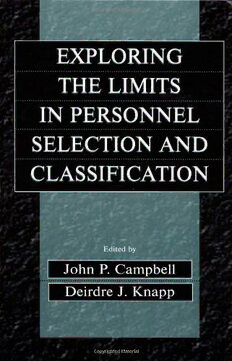Download Exploring the Limits in Personnel Selection and Classification PDF Free - Full Version
Download Exploring the Limits in Personnel Selection and Classification by John P. Campbell, Deirdre J. Knapp in PDF format completely FREE. No registration required, no payment needed. Get instant access to this valuable resource on PDFdrive.to!
About Exploring the Limits in Personnel Selection and Classification
Beginning in the early 1980s and continuing through the middle 1990s, the U.S. Army Research Institute for the Behavioral and Social Sciences (ARI) sponsored a comprehensive research and development program to evaluate and enhance the Army's personnel selection and classification procedures. This was a set of interrelated efforts, collectively known as Project A. Project A had a number of basic and applied research objectives pertaining to selection and classification decision making. It focused on the entire selection and classification system for Army enlisted personnel and addressed research questions that can be generalized to other personnel systems. It involved the development and evaluation of a comprehensive array of predictor and criterion measures using samples of tens of thousands of individuals in a broad range of jobs. The research included a longitudinal sample--from which data were collected at organizational entry--following training, after 1-2 years on the job and after 3-4 years on the job. This book provides a concise and readable description of the entire Project A research program. The editors share the problems, strategies, experiences, findings, lessons learned, and some of the excitement that resulted from conducting the type of project that comes along once in a lifetime for an industrial/organizational psychologist. This book is of interest to industrial/organizational psychologists, including experienced researchers, consultants, graduate students, and anyone interested in personnel selection and classification research.
Detailed Information
| Author: | John P. Campbell, Deirdre J. Knapp |
|---|---|
| Publication Year: | 2001 |
| ISBN: | 9780585418698 |
| Pages: | 680 |
| Language: | English |
| File Size: | 31.443 |
| Format: | |
| Price: | FREE |
Safe & Secure Download - No registration required
Why Choose PDFdrive for Your Free Exploring the Limits in Personnel Selection and Classification Download?
- 100% Free: No hidden fees or subscriptions required for one book every day.
- No Registration: Immediate access is available without creating accounts for one book every day.
- Safe and Secure: Clean downloads without malware or viruses
- Multiple Formats: PDF, MOBI, Mpub,... optimized for all devices
- Educational Resource: Supporting knowledge sharing and learning
Frequently Asked Questions
Is it really free to download Exploring the Limits in Personnel Selection and Classification PDF?
Yes, on https://PDFdrive.to you can download Exploring the Limits in Personnel Selection and Classification by John P. Campbell, Deirdre J. Knapp completely free. We don't require any payment, subscription, or registration to access this PDF file. For 3 books every day.
How can I read Exploring the Limits in Personnel Selection and Classification on my mobile device?
After downloading Exploring the Limits in Personnel Selection and Classification PDF, you can open it with any PDF reader app on your phone or tablet. We recommend using Adobe Acrobat Reader, Apple Books, or Google Play Books for the best reading experience.
Is this the full version of Exploring the Limits in Personnel Selection and Classification?
Yes, this is the complete PDF version of Exploring the Limits in Personnel Selection and Classification by John P. Campbell, Deirdre J. Knapp. You will be able to read the entire content as in the printed version without missing any pages.
Is it legal to download Exploring the Limits in Personnel Selection and Classification PDF for free?
https://PDFdrive.to provides links to free educational resources available online. We do not store any files on our servers. Please be aware of copyright laws in your country before downloading.
The materials shared are intended for research, educational, and personal use in accordance with fair use principles.

